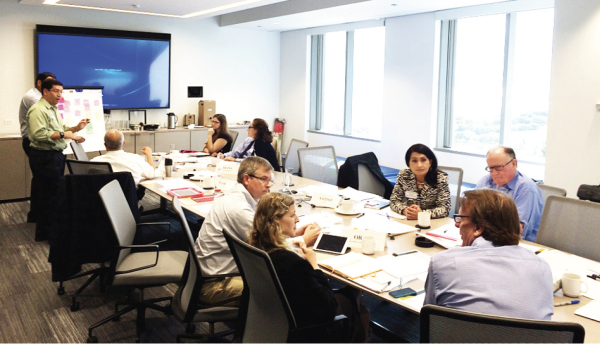From the Arab Spring to #BringBackOurGirls, Twitter has revolutionized the scaling of social engagement, and the engine for that scaling has been the hashtag. It seemed appropriate then, that I found myself live tweeting from KIN Global 2014 at the Kellogg School of Management, where the theme for the year was Change@Scale. Distilling profound insights from brilliant speakers into 140-character headlines – and often even into one hashtag-prefaced word – was no easy task. I aim to unpack some of those hashtags here.#values
Before determining how to scale, the foundational question must be: Why? As Richard Lariviere, CEO of the Field Museum, put it, “The most innovative ask: Why are we here?” and Ted Wright from FIZZ explained that his approach to “Word of Mouth” marketing begins with asking, “Why?”
And the answer to “Why?” must begin with #values.
#Value determination is a process. In the realm of science, for instance, University of Wisconsin’s David Krakuaer predicted that “the social-humanistic will reassert dominance” in search of a greater “need for explanation.” Applying this concept more generally, investor Esther Dyson argued for a renewed focus on the humanities and critical thinking in order to rediscover our common #values.
“#Values are at the core of any transformation,” entrepreneur Rey Ramsey argued. Of course, #values will differ between organizations. Jeff Semenchuk, for instance, aspires to lead Hyatt with a higher purpose of ‘Care’ and to scale innovation within that purpose. A panel of educational innovators agreed that technology and innovation can improve learning, but a failure to be mindful of the most important educational #values when scaling is dangerous.
The general sentiment at KIN Global was universal: successful Change@Scale begins with #values.
#passion
Whatever your organization’s values, successful scaling requires #passionate dedication. “Believe in your mission,” said Ann Hand of Project Frog, “and scale beyond your dreams.” Indeed, if you do not trust your #passion, as Kimbal Musk advised, failure is assured.
Use your #passion to gain buy-in from outside collaborators, as Rey Ramsey advised and leverage the #passion of your collaborators to achieve Change@Scale. Larry Lessig from Harvard, did just this in his effort to reform campaign finance from the ground up: “Pierce the politics of resignation, give people hope and they explode with #passion.”
#collaboration
While leadership’s individual passion is essential, scale also requires the #collaboration and engagement of many stakeholders. Often, the best collaboration comes from unexpected places through “Creative Coalitions.”
For instance, Mark Sirangelo of Sierra Nevada Corporation detailed their collaboration with NASA, which was crucial to their goal of private space travel. In the mining and energy space, industry has discovered the importance of #collaboration with local communities to achieving scale. Mark Cutifani of Anglo American warned, “Industry must partner with communities and lead – or face being left behind when environments change.” Important stakeholders, even those that are not natural allies, are often necessary to achieve Change@Scale.
As Rey Ramsey aptly described the general sentiment regarding #collaboration: “It will come from places you never expect; never stop seeking it.”
#fail
All scaling ventures will confront #failure at some point. An organizational culture that fears #failure renders innovation impossible because the individual collaborator’s incentive to innovate is always outweighed by the consequences of inevitable #failure.
Organizations that achieve Change@Scale encourage stakeholders to risk #failure, learn from it, and turn it into success. Says Sonny Garg of Exelon, “It’s important for management to set the example that the pursuit of innovation is rewarding by incentivizing individuals to proceed despite the risk of #failure. An organizational culture that does not fear #failure will not fear innovation. #Fail fast (and cheaply), learn, iterate, succeed, scale.”
#disruption
Innovation at scale inevitably leads to #disruption – of organization, industries and even whole societies. As David Krakauer stated, “All innovation is #disruptive,” and the greatest innovation is “not only invisible but offensive when visible.” Kimbal Musk identified one way to determine whether an idea is truly #disruptive, “Find the place it will never work and make it work there.”
Large organizations cannot avoid #disruption. Indeed, “if organizations are unprepared, industry change can happen overnight and render them obsolete,” warned Derek Mathieson of Baker Hughes. According to Dan Simpson and Zurich’s Geno Fernandez, the key is managing the pace of #disruption and its inherent risks.
And, of course, successful management of #disruption – and achievement of positive Change@Scale – requires a return to where we began: #values. Change is inevitable. Only by prioritizing our core #values will we be able to determine whether that change will be for the better. And isn’t that is the true goal of #Change@Scale?
Author: Nick Chapleau



